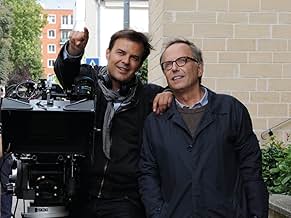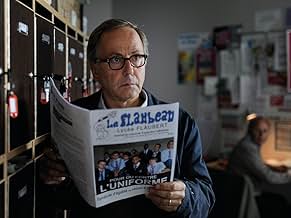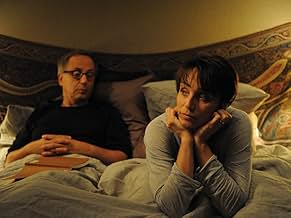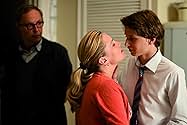A high school French teacher is drawn into a precocious student's increasingly transgressive story about his relationship with a friend's family.A high school French teacher is drawn into a precocious student's increasingly transgressive story about his relationship with a friend's family.A high school French teacher is drawn into a precocious student's increasingly transgressive story about his relationship with a friend's family.
- Awards
- 10 wins & 22 nominations total
Jana Bittnerová
- La doublure de la jumelle
- (as Jana Bittnerova)
- Director
- Writers
- All cast & crew
- Production, box office & more at IMDbPro
Storyline
Did you know
- TriviaErnst Umhauer said this about the character he plays in the movie: "He confuses his writing with reality and turns everything in his path upside-down. He has no distance, it takes him a long time to realize his words are stinging and can do damage. He's smart, but not very conscious of his responsibility".
- Goofs(at around 1h 35 mins) While Claude is walking through park, his hair is parted on different sides between shots.
- Quotes
Claude Garcia: But I love you.
Esther Artole: No. It's not me you love. It's an image. An image in your head.
- Crazy creditsThe opening credits are shown as if they were hand-written on graph paper.
- ConnectionsReferenced in La noche de...: La noche de... En la casa (2018)
- SoundtracksDynasty Tching Memories
Interprete par Wang Shu Imperial Orchestra
Arrangement de Thierry Woelfel
®2002 FGL Productions S.A, © Editions FGL
Avec l'aimable autorisation de FGL Productions S.A
Featured review
In the House (2012)
Another curious reality shifting movie in the most subtle and old fashioned of ways—the realism of good fiction. A young writer creates a reality in his essays that is shown as if real on screen. The characters around the writer, and within the fictional story, get intertwined because they are all the same. This game of deception is coy but also witty and warm, and it's a fun, genuine movie.
I'm not sure how much logic you should try to apply to things here. I assume they have it worked out perfectly, but watching it lightly the layers of reality get necessarily confusing. In a way this doesn't matter, because you get the general drift.
Which is this: a literature teacher in high school has a talented student, Claude, who writes fictional essays about real people. One is another student, Rapha, and we see events in this other student's house because of the writing (and have to guess whether or not those events are fact or fiction).
The teacher talks to Claude about the content, wondering if it's fair to lay open Rapha's life, and the student smartly says that it was written for the teacher alone. This brings the teacher into the story in ways he doesn't suspect. It also shows the audience that Claude is outfoxing his teacher and we are going to see a game played as Claude's writings raise reactions in the teacher that affect the fictional plot. Or is it the actual plot? Or both?
Exactly.
The director, Francois Ozon, is no stranger to this type of game playing. The famous earlier film of his in the U.S. is "Swimming Pool," a remake of an earlier film that has the same tricks played on the audience. It's never quite enough to have this slippery reality be the basis of a movie, and in "Swimming Pool" the events became quite dramatic and psychologically interesting. The ambitions for "In the House" are smaller and less chilling, and in a way less effective, but also less sensationalist and more believable. We have here more of an ensemble piece, a charmer, a play brought to the screen.
And it does rise above mere literary cleverness because of the leading man, the teacher, played by Fabrice Luchini, who will be familiar even to American audiences. His wife is the dependable Kristin Scott Thomas (speaking in French). The two of them make a likable intellectual couple (and her own role as an contemporary art dealer plays a small part in the plot). The way they talk about Claude's regular installments is how we get to think about the interweaving of realities.
And does it ever get interwoven. Keep track of it is you can. Otherwise, just enjoy the show.
Another curious reality shifting movie in the most subtle and old fashioned of ways—the realism of good fiction. A young writer creates a reality in his essays that is shown as if real on screen. The characters around the writer, and within the fictional story, get intertwined because they are all the same. This game of deception is coy but also witty and warm, and it's a fun, genuine movie.
I'm not sure how much logic you should try to apply to things here. I assume they have it worked out perfectly, but watching it lightly the layers of reality get necessarily confusing. In a way this doesn't matter, because you get the general drift.
Which is this: a literature teacher in high school has a talented student, Claude, who writes fictional essays about real people. One is another student, Rapha, and we see events in this other student's house because of the writing (and have to guess whether or not those events are fact or fiction).
The teacher talks to Claude about the content, wondering if it's fair to lay open Rapha's life, and the student smartly says that it was written for the teacher alone. This brings the teacher into the story in ways he doesn't suspect. It also shows the audience that Claude is outfoxing his teacher and we are going to see a game played as Claude's writings raise reactions in the teacher that affect the fictional plot. Or is it the actual plot? Or both?
Exactly.
The director, Francois Ozon, is no stranger to this type of game playing. The famous earlier film of his in the U.S. is "Swimming Pool," a remake of an earlier film that has the same tricks played on the audience. It's never quite enough to have this slippery reality be the basis of a movie, and in "Swimming Pool" the events became quite dramatic and psychologically interesting. The ambitions for "In the House" are smaller and less chilling, and in a way less effective, but also less sensationalist and more believable. We have here more of an ensemble piece, a charmer, a play brought to the screen.
And it does rise above mere literary cleverness because of the leading man, the teacher, played by Fabrice Luchini, who will be familiar even to American audiences. His wife is the dependable Kristin Scott Thomas (speaking in French). The two of them make a likable intellectual couple (and her own role as an contemporary art dealer plays a small part in the plot). The way they talk about Claude's regular installments is how we get to think about the interweaving of realities.
And does it ever get interwoven. Keep track of it is you can. Otherwise, just enjoy the show.
- secondtake
- Dec 5, 2013
- Permalink
- How long is In the House?Powered by Alexa
Details
- Release date
- Country of origin
- Official sites
- Language
- Also known as
- En la casa
- Filming locations
- Production companies
- See more company credits at IMDbPro
Box office
- Gross US & Canada
- $389,757
- Opening weekend US & Canada
- $31,441
- Apr 21, 2013
- Gross worldwide
- $16,190,771
- Runtime1 hour 45 minutes
- Color
- Sound mix
- Aspect ratio
- 1.85 : 1
Contribute to this page
Suggest an edit or add missing content






























